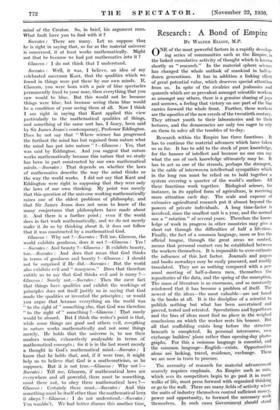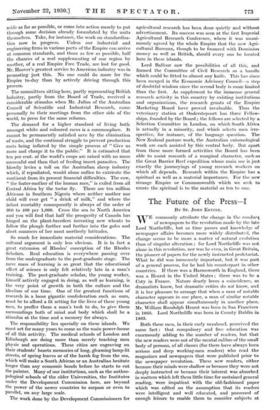Research : A Bond of Empire
BY WALTER ELLIOT, M.P.
Research within the Empire has three functions. It has to continue the material advances which have taken us so far. It has to add to the stock of pure knowledge, for the honour of intellect and because no one can say what the use of such knowledge ultimately may be. It has to act as one of the strands, perhaps the strongest, in the cable of interwoven intellectual sympathies which in the long run must be relied on to hold together a system covering a quarter of the world's surface. AU these functions work together. Biological science, for instance, in its applied form of agriculture, is receiving more attention each day. The scale and expense of extensive agricultural research put it almost beyond the powers of private individuals. A long time-factor is involved, since the smallest unit is a year, and the normal one a " rotation " of several years. Therefore the know- ledge of work in progress in other countries may give a short cut through the difficulties of half a life-time. Finally, the fact of a common language, more or less the official tongue, through the great areas we control, means that personal contact can be established between the workers themselves. It is impossible to over-estimate the influence of this last factor. Journals and papers and books nowadays may be easily procured, and readily translated. They are as nothing compared with a per- sonal meeting of half-a-dozen men, themselves the repositories of the data, and the spring of the conception. The mass of literature is so enormous, and so constantly reinforced that it has become a problem of itself. The newest of the ideas—the most valuable—are not found in the books at all. It is the discipline of a scientist to publish nothing but what has been ascertained and proved, tested and retested. Speculations and hypotheses and the bias of ideas must find no place in the weighed conclusions on which the worker rests his honour. Bat all that scaffolding exists long before the structure beneath is completed. In personal intercourse, men exchange builders' plans rather than opening-day plwto- graphs". For this a common language is essential, and, the common language—English—exists. Opportunities alone are lacking, travel, residence, exchange. These we are now in train to procure.
The necessity . of research for material advancement scarcely requires emphasis, An Empire such as ours,. which sees its competitors. begin to go past it in many walks of life, must press forward with organized thinking or go to the wall. There are manyfichis of activity where the units of industry themselves control sufficient money, power and opportunity, to forward. the necessary work, themselves, In such eases Oovern,ment phould stand
aside as far as possible, or come into action merely to put through some decision already formulated by the units themselves. Take, for instance, the work on standardiza- tion now in progress. Unless our industrial and engineering firms in various parts of the Empire can arrive at common standards, and those as few as possible, half the chances of a real supplementing of one region by another, of a real Empire Free Trade, are lost for good. Mr. Hoover's greatest service to American industry was in promoting' just this. No one could do more for the Empire to-day than by actively driving through this process.
The committees sitting here, partly representing British induStry, partly froth the Board of Trade, received a considerable stimulus when Mr. Julius of the Australian Council of Scientific and Industrial Research, came personally to their meetings from the other side of the world, to press for the same reforms.
The demand for a higher standard of living both amongst white and coloured races is a commonplace. It cannot be permanently satisfied save by the elimination of waste, and the continual struggle to prevent production costs being inflated by the simple process of " Give us more and charge it to the public." It is estimated that ten per cent. of the world's crops are raised with no more successful end than that of feeding insect parasites. The blowfly levies a toll on the Australian sheep industry which, if repudiated, would alone suffice to extricate the continent from its present financial difficulties. The cow, " the foster-mother of the human race," is exiled from all Central Africa by the tsetse fly. There are ten million Africans in Southern Nigeria where neither mother nor child will ever get " a drink of milk," and where the infant mortality consequently is always of the order of 300 to 400 per 1,000. Cross the sea to North America and you will find that half the prosperity of Canada has hinged on the plant-breeders inventing new wheats to follow the plough further and further into the gales and short summers of her most northerly latitudes.
So much for immediate material considerations. The cultural argument is only less obvious. It is in fact a great extension of Rhodes' conception of the Rhodes Scholars. Real education is everywhere passing over from the undergraduate to the post-graduate stage. The mere mass of learning is so great that the educational effect of science is only felt relatively late in a man's training. The post-graduate scholar, the young worker, himself actively engaged in doing, as well as learning, is the very point of growth in both the culture and the idealism of our time. One of the greatest functions of research in a loose gigantic confederation such as ours, must be to afford a fit setting for the lives of these young men, to proffer them a man's task to do, to give them surroundings both of mind and body which shall be a stimulus at the time and a memory for always.
The responsibility lies specially on these islands. We must act for many years to come as the main power-house of all this activity. The medical schools of London and Edinburgh are doing more than merely teaching men physic and operations. These cities are engraving on their students' hearts memories of long, gleaming lamp-lit streets, of spring leaves or of the harsh fog from the sea, which will make a South African or an Australian hesitate longer than any economic bonds before he starts to cut the painter. Many of our institutions, such as the anthro- pological schools of the older Universities, the Institutes under the Development Commission here, are beyond the power of the newer countries to surpass or even to parallel, on any large scale.
The work done by the Development Commissioners for agricultural research has been done quietly and without advertisement. Its success was seen at the first Imperial Agricultural Research Conference, where it was unani- mously agreed by the whole Empire that the new Agri- cultural Bureaux, though to be financed with Dominion money as well as British, should every one be located here in these islands.
Lord Balfour saw the possibilities of all this, and framed the Committee of Civil Research as a handle which could be fitted to almost any knife. This has since been merged in the Economic Advisory Council—a step of doubtful wisdom since the second body is more limited than the first. As supplement to the immense general research activity in this country by existing institutions and organizations, the research grants of the Empire Marketing Board have proved invaluable. Thus the veterinary station at Onderstepoort has three Fellow- ships, founded by the Board ; the fellows are selected by a Selection Committee in London, on which South Africa is actually in a minority, and which selects men irre- spective, for instance, of the language question. The New Zealand pasture work, the Australian entomological work are each assisted by this central body. But apart from these more formed activities the Board has been able to assist research of a marginal character, such as the Great Barrier Reef expedition whose main use is just exactly the joumeyings of young research workers on which all depends. Research within the Empire has a spiritual as well as a material importance. For the new strange Empire or Commonwealth which we seek to create the spiritual is to the material as ten to one.



















































































 Previous page
Previous page